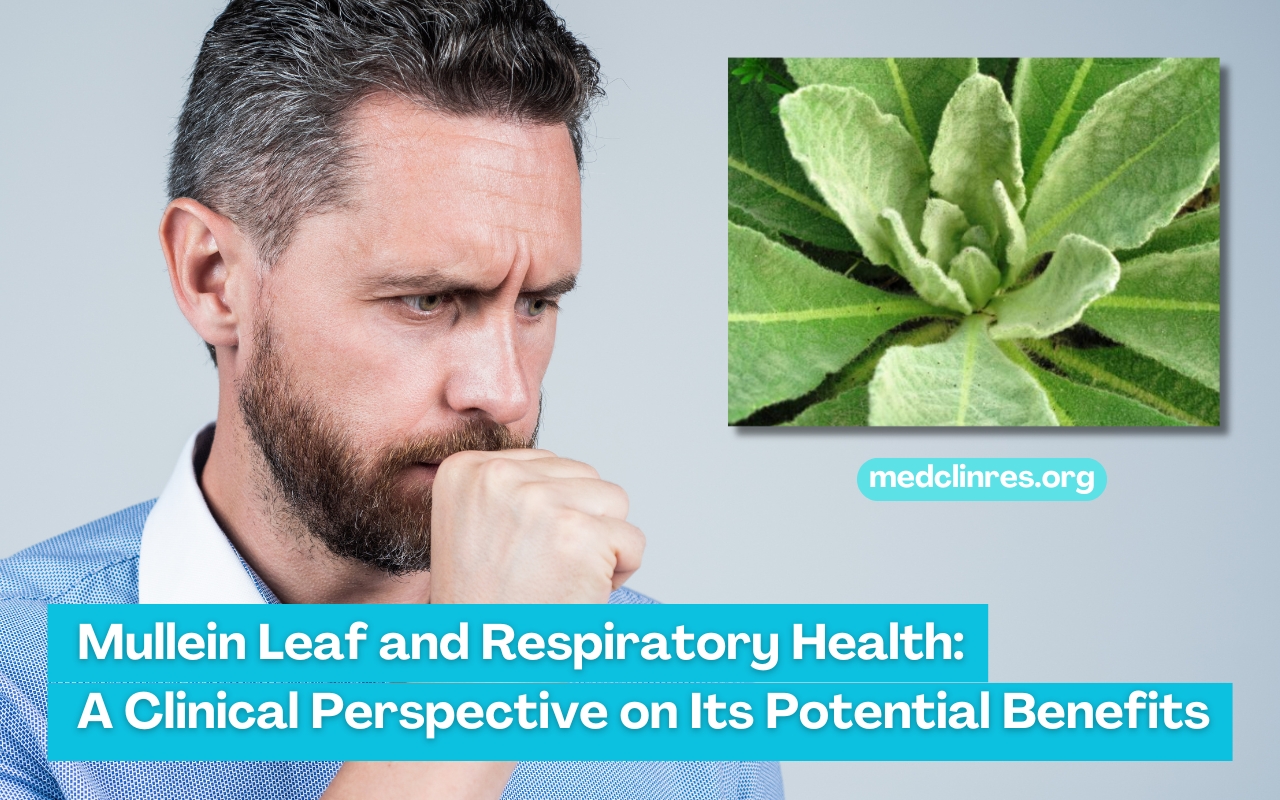
Mullein leaf (Verbascum thapsus) has been a staple in traditional herbal medicine for centuries, often employed for its purported benefits in respiratory support, inflammation reduction, and skin health. Despite its extensive history of use, scientific research on its efficacy remains inconclusive. This article evaluates the pharmacological profile, clinical relevance, and safety considerations of mullein leaf from a research-based perspective.
Botanical Profile and Traditional Applications
Mullein is a biennial herbaceous plant indigenous to Europe, Asia, and North Africa, now widely naturalized in North America. Recognizable by its towering yellow flower spikes and broad, velvety leaves, this plant has been utilized in various herbal preparations, including teas, tinctures, extracts, and oils. Traditionally, mullein has been prescribed for respiratory ailments, dermatological conditions, and inflammatory disorders.
Therapeutic Applications and Mechanisms
1. Respiratory Health Support
Mullein is most frequently associated with lung health and has been traditionally used to address:
- Chronic and acute coughs
- Bronchitis
- Asthma
- Hoarseness
- Tonsillitis
The plant contains bioactive compounds with expectorant and anti-inflammatory properties, which may aid in mucus clearance and provide soothing effects on irritated airways. However, more clinical studies are needed to substantiate these claims.
2. Otic Health (Ear Infections and Discomfort)
Mullein flower-infused oil has been used as a natural intervention for earaches and infections. Due to its antimicrobial and analgesic properties, it has been included in traditional herbal ear drop formulations to mitigate inflammation and alleviate discomfort.
3. Dermatological Applications and Wound Healing
The topical application of mullein-infused oils and salves has been explored for:
- Minor burns
- Wound healing acceleration
- Eczema and rashes
Research suggests that its astringent and anti-inflammatory compounds may support tissue repair and mitigate skin irritation.
4. Anti-Inflammatory and Analgesic Effects
Mullein is rich in plant-based anti-inflammatory agents that have been examined for their role in managing:
- Osteoarthritis
- Rheumatoid arthritis
- Muscle pain and soreness
Some preliminary research suggests that flavonoids such as kaempferol may play a role in modulating inflammatory responses, although human trials remain scarce.
5. Gastrointestinal Support
Mullein tea is traditionally used to soothe digestive disturbances, particularly:
- Diarrhea
- Gut inflammation
The plant's antimicrobial and astringent properties may contribute to gut microbiota balance and intestinal lining integrity, though further research is warranted.
Phytochemical Composition and Active Compounds
Mullein leaf contains a complex array of bioactive constituents that contribute to its pharmacological activity, including:
- Flavonoids – Antioxidants with anti-inflammatory and immune-modulating effects.
- Saponins – Expectorant agents that aid in mucus clearance from the respiratory tract.
- Glycosides – Potential contributors to pain relief and wound healing.
- Tannins – Astringents that may aid in skin health and gastrointestinal function.
- Ursolic Acid – Exhibits antimicrobial and anti-inflammatory properties.
Forms of Administration and Dosage Considerations
Mullein is commercially available in multiple forms, allowing for diverse therapeutic applications:
1. Mullein Tea
- One of the most accessible consumption methods.
- Made by steeping dried leaves or flowers in hot water.
- Often utilized for respiratory relief.
2. Mullein Oil
- Typically infused in olive oil or another carrier oil.
- Applied for ear infections, skin ailments, and minor pain relief.
3. Mullein Extracts and Tinctures
- Highly concentrated liquid formulations.
- Can be consumed orally or diluted in water for systemic benefits.
4. Mullein Capsules and Supplements
- Encapsulated formulations for ease of administration.
- Frequently marketed for lung and immune health support.
5. Mullein Creams and Salves
- Used for topical application to alleviate skin irritation or muscular discomfort.
- Often blended with other botanicals for enhanced therapeutic effects.
Safety Profile and Potential Adverse Effects
Mullein is widely considered safe when used appropriately; however, several considerations should be noted:
- Allergic Reactions: Some individuals may experience skin irritation or mild hypersensitivity.
- Pregnancy and Lactation: Due to a lack of definitive safety data, healthcare consultation is recommended before use.
- Drug Interactions: While no significant interactions have been documented, individuals on medication should seek professional guidance before incorporating mullein supplements.
- Product Quality: It is crucial to select reputable brands with third-party testing to ensure purity and potency.
Comparative Herbal Alternatives
For individuals seeking botanicals with comparable benefits, the following may serve as suitable alternatives:
- Peppermint oil – Supports respiratory and gastrointestinal health.
- Curcumin (from turmeric) – Exhibits potent anti-inflammatory properties.
- Honey – Provides antimicrobial and soothing effects, particularly for sore throats.
- Zinc – Plays a crucial role in immune function and wound healing.
- Magnesium – Aids in muscle relaxation and overall physiological balance.
Conclusion: A Research-Based Perspective on Mullein Leaf
Mullein leaf has been traditionally utilized for respiratory health, inflammation modulation, and skin healing. While preliminary evidence suggests promising therapeutic potential, further clinical validation is required to confirm its efficacy. As with any botanical intervention, consulting a healthcare professional before use is advised, particularly for individuals with pre-existing conditions or those on medication.
By integrating mullein into evidence-based wellness strategies, individuals may harness its natural properties to support respiratory function and overall well-being.